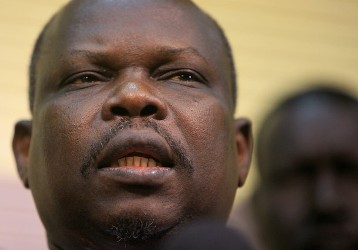S. Sudan’s Pagan says Khartoum hampers security talks, returns to Juba for consultations
July 26, 2012 (Addis Ababa) – South Sudan‘s chief negotiator, before departing for Juba, accused Sudan of declining to adopt the map proposed by the African Union (AU) mediation team to implement a buffer zone on the common border, with less than a week to the 2 August deadline set by the United Nations Security Council (UNSC).

Sudan kept rejecting any compromise over a disputed area called Mile 14 the mediation considers it as a disputed areas on the common border and included it in a buffer zone that the parties should implement before the 2 August.
Pagan Amum, South Sudan’s chief negotiator told reporters, before leaving for the venue of the peace talks in Addis Ababa, that President Salva Kiir summoned him and the defence minister John Kong Nyuon, for consultations on the talks.
He pointed out that Sudan’s refusal to endorse the implementation of the buffer is a clear breach to the United Nation (UN) resolution 2046.
Pagan Amum further said his country has declared a cessation of hostilities and unconditionally accepted the map proposed by the AU High Level Implementation Panel (AUHIP) to establish, without further delay, the Safe Demilitarized Buffer Zone (SDBZ), and immediately activate all security mechanisms.
The two countries, under the facilitation of AUHIP, are engaged in post-secession talks on issues such as border and security, the economy, oil, citizenship status and the disputed Abyei region.
However, in the African Union road map and the UN resolution Sudan reaffirm that the use of the AUHIP 2011 Map to establish the SDBZ and to implement the associated security agreements, in no way, prejudices the final settlement of any outstanding disputed and claimed areas or the demarcation of the boundary.
Sudan and South Sudan, on Thursday, began direct talks on the oil dispute for the first time since the latter shut down its oil production early this year. The two nations, the UNSC has warned, risk facing sanctions should they fail to strike a comprehensive deal.
(ST)
